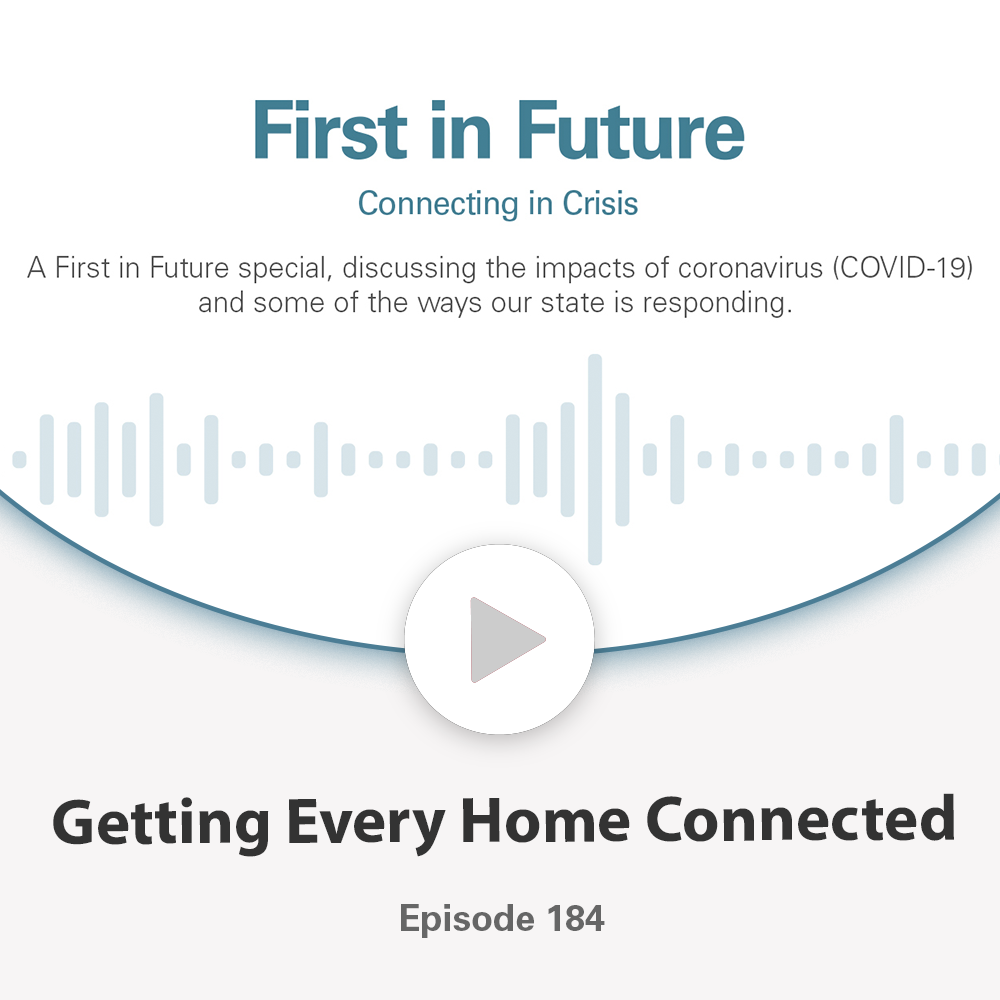First in Future: Getting Every Home Connected

 Summary: Leslie Boney, Director of the Institute for Emerging Issues, hosts a series of virtual conversations discussing the impacts of coronavirus (COVID-19) and some of the ways our state is responding.
Summary: Leslie Boney, Director of the Institute for Emerging Issues, hosts a series of virtual conversations discussing the impacts of coronavirus (COVID-19) and some of the ways our state is responding.
Join us with guests US Rep. G.K. Butterfield (NC 1st District), NC Rep. Josh Dobson (District 85), Angela Siefer (Executive Director, National Digital Inclusion Alliance) and Amy Huffman (Digital Inclusion and Policy Manager, NC Broadband Infrastructure Office) as they discuss how to close the homework (and work) gap during the crisis.
*This episode of First in Future was recorded on Thursday, April 23rd, and reflects information that was up-to-date at that time.*
View the slides here.
Listen to the podcast or Watch Zoom Video
Highlights & Resources
When the pandemic started:
- 1 out of 4 of people had no computer in their home
- 1 out of 12 had access to the internet only through smartphone
- 5% of NC didn’t have any chance of getting broadband in their homes
- Bigger challenge is subscription – about 22% of households don’t subscribe to any kind of internet, 40% don’t subscribe to broadband
- NC BIO has created a resource to find free/low-cost service/equipment and has made recommendations for immediate, short-term, and long-term policy
US Rep. G.K. Butterfield (NC 1st District)
- Many Americans still don’t have access to the internet – especially evident in rural communities. The pandemic has made clear the necessity of a consistent, high speed internet connection for participation in the 21st century – for education, work, and health care.
- Millions of employees are working remotely: “Working from home is often only possible with a broadband connection, and in rural districts, like my district, many residents continue to make do with a limited or inconsistent broadband access, putting their economic stability at significant risk.”
- Rep. Butterfield joined several lawmakers representing rural districts to form a congressional rural broadband task force that has drafted language that would provide $80 billion in the next stimulus package specifically to fund the deployment of secure and reliable internet connections. Subject to a lot of moving parts but it should be in the next package.
- Broadband is as essential for family success as electricity, water, and gas. There is bipartisan support for the concept.
- (US Rep. Butterfield had to leave to vote on an emergency supplemental bill that will appropriate an additional $470 billion into recovery)
NC Rep. Josh Dobson (District 85)
- Has seen strategies to get people online in his district: providing devices to students, hot spots at fire departments, schools, etc.
- Sponsored a bill called Fiber NC that passed with bipartisan support – Dobson is working with the chairman of the Finance Committee to have the bill heard in short session when they return to Raleigh.
- Co-sponsored the GREAT act to extend access to more people in NC. *Amy Huffman later clarified that while the appropriations bill did not pass, a mini budget was passed providing $15 million that will be deployed this year.
- Both he and Butterfield serve different constituents but their problems with access are the same. He hopes the crisis will be a catalyst to solve the problem.
- We should absolutely think of internet as a utility. Need to do everything we can to make sure areas that are struggling economically have the same access to high speed internet.
- (NC Rep. Dobson had to leave to introduce the appropriations bill)
Angela Siefer (Executive Director, National Digital Inclusion Alliance)
- It’s encouraging that NC has champions. NC’s state broadband office is a national model. Even though folks are frustrated, there’s incredible momentum coming out of NC.
- Wish we could focus more on utilizing wireline connections like DSL, cable and fiber (more stable, cheaper) rather than setting up hot spots – which are a great, fast solution for the housing insecure, but more expensive.
Amy Huffman (Digital Inclusion and Policy Manager, NC Broadband Infrastructure Office)
- We’re excited and thankful for the strong leadership and hard work from both representatives.
- Thanks to the mini budget passed last year, $15 million in funding will be deployed this year to increase access through long-term projects. Right now, decisions are being made to award grants to providers to build networks.
Angela Siefer
- There is overlap between those who don’t have broadband and those who are hardest hit by pandemic – lack of information could be a component but the research didn’t dive into that. Those people are forced to leave their homes more than those who have broadband, so sheltering in place is less doable.
- Need more federal support in the next package for connectivity, devices, and tech support.
- Medicare/Medicaid is now covering telehealth – which is fabulous – but comes back to the issue of who doesn’t have internet and can’t take advantage. It’s unclear if that money will cover someone’s broadband to use telehealth services. Those without broadband are more likely to leave their homes to go to the doctor and put themselves and others at risk.
- There are some funds through Department of Education that can be used for connectivity – but unclear how those will exactly get used.
- Equity challenge: Data tells us those most likely to not have access are low income, seniors, people of color. For seniors especially, it could be a life and death issue to not have broadband in their homes.
- The big focus is on students right now. Communities & the federal government needs to consider everybody – especially with increase in unemployment – to help more families in need than we’ve ever seen before.
- We’re seeing incredible efforts by folks who are putting themselves at risk as they refurbish & distribute computers.
- “Digital navigators” programs – groups who are already working with at-risk populations who can talk through issues on the phone – help them find devices, opportunities open to them.
- We should not lose this opportunity and awareness – this is our moment to move. We have to be prepared. We may not go back to normalcy. We have to have funding for rural access, the right devices, and tech support/digital skills learning.
Amy Huffman
- Support refurbishers:
- Schools need to implement 1:1 policies
- Need funding, sustained leadership, lots of public-private partnerships, and collaboration at all levels of government to get this done.
- Exciting ideas: Dogwood Health Trust funded hotspots in WNC; Digital Durham drafted a letter to local policymakers to encourage them to address issues locally; Kramden (device refurbisher) set up socially distant distribution of devices.
- “The truth is, a lot of our work is being done for us now. A lot of my work was building awareness around these issues. I no longer have to do that. No one is asking why closing the digital divide is important. Everyone truly understands that now. So I think as we move forward, we’ll continue to see innovative solutions that come from our local folks to bridge that divide.”
- Categories:



